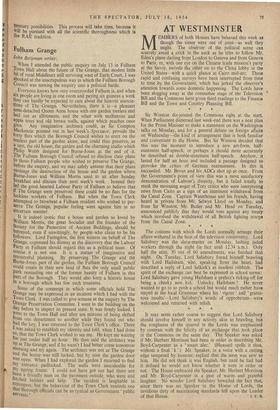When I attended the public enquiry on July 13 in
Fulham Town Hall about the future of The Grange, that modest little bit of rural Middlesex still surviving west of Earls Court, I was shocked at the unscrupulous way in which the Fulham Borough Council was turning the enquiry into a political battle.
Everyone knows how very overcrowded Fulham is, and when they people are living in one room and paying six guineas a week they can hardly be expected to care about the historic associa- llOns of The Grange. Nevertheless, there it is—a pleasant semi-detached Queen Anne house with one garden treeless and laid out as allbtments, and the other with mulberries and apple trees and old brown walls, against which peaches once grew. Any imaginative architect could, as Sir Compton Mackenzie pointed out in last week's Spectator, provide the ((MY flats which the Borough Council wishes to erect on the treeless part of the garden alone, and could thus preserve, as a unit, the old house, the garden and the charming studio which Philip Webb designed for Burne-Jones at the end of it. 'he Fulham Borough Council refused to disclose their plans to those Fulham people who wished to preserve The Grange, before the enquiry, and we may safely assume that their plans envisage the destruction of the house and the garden where. Burne-J ones and William Morris used to sit after Sunday breakfast and discuss their next week's work. Instead they led the good hearted Labour Party of Fulham to believe that if The Grange were preserved there could be no flats for the luckless workers of Fulham. But when the Town Clerk attempted to browbeat a Fulham resident who wished to pre- serve The Grange, popular feeling went against him in no Uncertain manner.
It is indeed ironic that a house and garden so loved by William Morris. the great Socialist and the founder of the Society for the Protection of Ancient Buildings, should be betrayed, even if unwittingly, by people who claim to be his followers. Lord Faringdon, the first witness on behalf of The Grange, expressed his dismay at the discovery that the Labour Party in Fulham should regard this as a political issue. Of course it is not one. It is a matter 'of imaginative and resourceful planning. By preserving The Grange and tilt Surne-Jones part of the garden, the Fulham Borough Council could create in their new land of flats the only small public park reminding one of the former beauty of Fulham in this Part of the Borough. They would also keep a historic house P a borough which has few such treasures.
Some of the contempt in which some officials hold The Grange may be expressed in an incident which I had with the Town Clerk. I was called to give witness at the enquiry by The Grange Preservation Committee. I went to the building on the day before to inspect its present state. It was firmly locked. I Went to the Town Hall and after ten minutes of being shifted from one department to another while they found out who had the key, I was returned to the Town Clerk's office. There I was asked to establish my identity and told, when I had done 80, that the Town Clerk wished to see me. He kept me waiting for just under half an hour. He then said the architect was 11P at The Grange, and if he wasn't I had better come tomorrow morning and try again. The architect was not at The Grange and the house was still locked, but by now the garden door Was open. When I had explored the garden I returned to find my entrance padlocked. The walls were unscaleable for thy ageing frame. I could not have got out had there not been a friendly man on the pavement outside, who went and fetched ladders and help. The incident is laughable in retrospect, but the behaviour of the Town Clerk reminds one that Borough officials can be as cynical as Government public servants.'


































 Previous page
Previous page